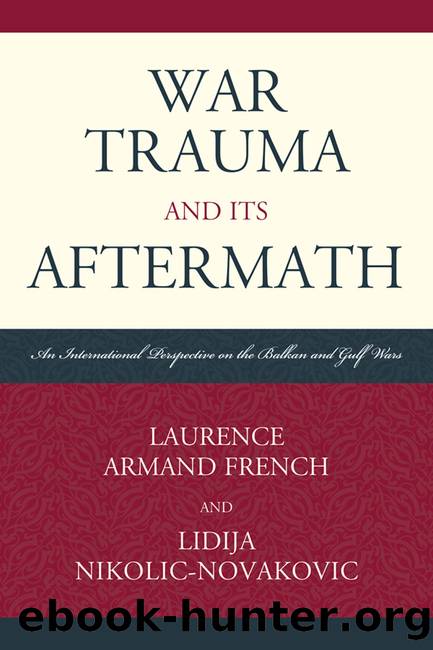War Trauma and its Aftermath by French Laurence Armand;Nikolic-Novakovic Lidija; & Lidija Nikolic-Novakovic

Author:French, Laurence Armand;Nikolic-Novakovic, Lidija; & Lidija Nikolic-Novakovic
Language: eng
Format: epub
ISBN: 1767187
Publisher: UPA
General War Trauma
General war trauma involves the larger population engulfed in the Balkan Wars of 1991-2002, civilians as well as veterans. An area of concern here is that of increased violence including homicides and suicides. A major study conducted by the Trauma Studies Unit, Institute of Psychiatry, Kingâs College of London from March 2000 to July 2002 and published in the Journal of the American Medical Association (JAMA) in August 2005, addressed the psychiatric and cognitive effects of the Balkan Wars in the former Yugoslavia by interviewing 1,358 war survivors from Belgrade, Serbia; Rijeka, Croatia; Sarajevo, Federation of Bosnian-Herzegovina, BiH; and Banja Luka, Republic of Srpska, BiH. The sample consisted of men and women including combat veterans and torture survivors, many of them refugees (Internally Displaced Persons - IDPs). A control group based on sectarianism, gender, and age was also used in the study. According to the study, the IDPs in Belgrade included Kosovo Serbs displaced due to the NATO bombardment while the IDPs in Banja Luka were the Serbs forced from Muslim and Croat sections of BiH. The IDPs in Rijeka were mostly Croats from the Vukovar region and the IDPs in Sarajevo had been displaced by Serb-controlled regions in Bosnia. Regardless of sectarian affiliation, the findings showed a common theme: that the survivors reported a sense of injustice in relations to what they perceived to be a lack of redress for their trauma. In relations to the control group, the traumatized survivors had stronger emotional responses to impunity, a greater fear and loss of control over their lives, a diminished belief in the benevolence of people, a stronger affiliation to the dictates of their sectarian beliefs and higher rates of PTSD and depression.19
A study conducted in Croatia by faculty at the Split University Hospital and the Canton Institute of Public Health found an increase in the number of violent deaths in South Croatia (the region most involved in the 1991-1993 conflict). Not only was there an increase in homicides (77) and suicides (254) during the war but the method of death was more violent as well, including firearms and explosives especially among the younger population and those with military background. The researchers concluded that war related trauma seems to have a direct influence on both the number and pattern of violent deaths in this population.20
Research on pervasive war trauma in Bosnia-Herzegovina, the region that saw the most intense and prolonged conflict during the war years of 1992-1995, include a study conducted by the University Clinical Centre in Tuzla, now part of the Federation of Bosnia-Herzegovina (FBiH). This retrospective study, published in 2008, looked at 8,329 outpatients, 617 inpatients and 301 patients in the partial hospitalization program during the period 1999-2003. More psychotraumatized women were represented in the partial hospitalization program (61%) than in either the inpatient (24%) or outpatient (18%) programs. PTSD was found to be present in the majority (65%) of the patients overall with the majority of these individuals (73%) also presenting with comorbid other mental health problems.
Download
This site does not store any files on its server. We only index and link to content provided by other sites. Please contact the content providers to delete copyright contents if any and email us, we'll remove relevant links or contents immediately.
The Vikings: Conquering England, France, and Ireland by Wernick Robert(83885)
Ali Pasha, Lion of Ioannina by Eugenia Russell & Eugenia Russell(40245)
The Conquerors (The Winning of America Series Book 3) by Eckert Allan W(37389)
The Vikings: Discoverers of a New World by Wernick Robert(36974)
Cecilia; Or, Memoirs of an Heiress — Volume 1 by Fanny Burney(32548)
Cecilia; Or, Memoirs of an Heiress — Volume 2 by Fanny Burney(31947)
Cecilia; Or, Memoirs of an Heiress — Volume 3 by Fanny Burney(31932)
Empire of the Sikhs by Patwant Singh(23074)
The Secret History by Donna Tartt(19058)
Hans Sturm: A Soldier's Odyssey on the Eastern Front by Gordon Williamson(18575)
Cat's cradle by Kurt Vonnegut(15339)
Pimp by Iceberg Slim(14489)
Sapiens: A Brief History of Humankind by Yuval Noah Harari(14371)
Talking to Strangers by Malcolm Gladwell(13350)
Norse Mythology by Gaiman Neil(13349)
Leonardo da Vinci by Walter Isaacson(13319)
4 3 2 1: A Novel by Paul Auster(12377)
Underground: A Human History of the Worlds Beneath Our Feet by Will Hunt(12090)
The Radium Girls by Kate Moore(12018)
